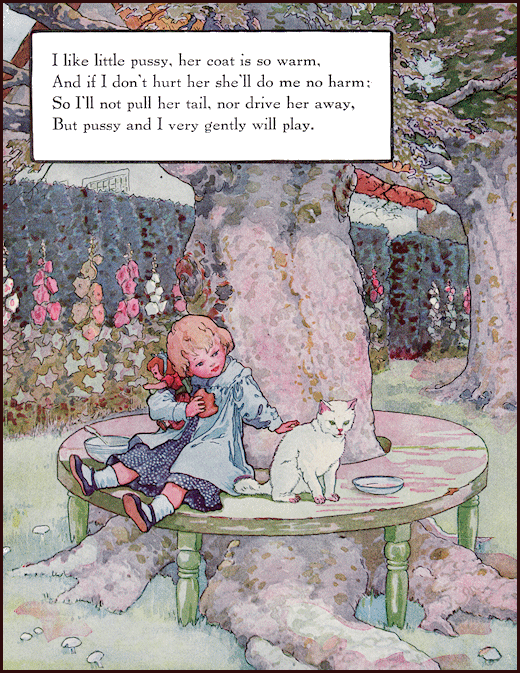
Songs for March
|
|
The Horseman
|
I heard a horseman Ride over the hill; The moon shone clear, The night was still; His helm was silver, And pale was he; And the horse he rode Was of ivory. |
 Songs for March
|
The Horseman
|
| ||||||||||||||||||||||||||||||
How the Rhinoceros Got His Skin![[Illustration]](http://www.gatewaytotheclassics.com/gold/books/kipling/just/kipling_just_zpage029a.gif)
![[Illustration]](http://www.gatewaytotheclassics.com/gold/books/kipling/just/kipling_just_zpage029.gif)
O
NCE upon a time, on an uninhabited island on the shores of the
Red Sea, there lived a Parsee from whose hat the rays of the sun
were reflected in more-than-oriental splendour. And the Parsee
lived by the Red Sea with nothing but his hat and his knife and a
cooking-stove of the kind that you must particularly never touch.
And one day he took flour and water and currants and plums and
sugar and things, and made himself one cake which was two feet
across and three feet thick. It was indeed a Superior
Comestible (that's magic), and he put it on the stove
because he was allowed to
cook on that stove, and he baked it and he baked it till it was
all done brown and smelt most sentimental. But just as he was
going to eat it there came down to the beach from the Altogether
Uninhabited Interior one Rhinoceros with a horn on his nose, two
piggy eyes, and few manners. In those days the Rhinoceros's skin
fitted him quite tight. There were no wrinkles in it anywhere.
He looked exactly like a Noah's Ark Rhinoceros, but of course
much bigger. All the same, he had no manners then, and he has no
manners now, and he never will have any manners. He said, "How!"
and the Parsee left that cake and climbed to the top of a palm
tree with nothing on but his hat, from which the rays of the sun
were always reflected in more-than-oriental splendour. And the
Rhinoceros upset the oil-stove with his nose, and the cake rolled
on the sand, and he spiked that cake on the horn of his nose, and
he ate it, and he went away, waving his tail, to the desolate and
Exclusively Uninhabited Interior which abuts on the islands of
Mazanderan, Socotra, and Promontories of the Larger Equinox.
Then the
Parsee came down from his palm-tree and put the stove on
its legs and recited the following Sloka, which, as you have not
heard, I will now proceed to
And there was a great deal more in that than you would think. Because, five weeks later, there was a heat wave in the Red Sea, and everybody took off all the clothes they had. The Parsee took off his hat; but the Rhinoceros took off his skin and carried it over his shoulder as he came down to the beach to bathe. In those days it buttoned underneath with three buttons and looked like a waterproof. He said nothing whatever about the Parsee's cake, because he had eaten it all; and he never had any manners, then, since, or henceforward. He waddled straight into the water and blew bubbles through his nose, leaving his skin on the beach. Presently the Parsee came by and found the skin, and he smiled one smile that ran all round his face two times. Then he danced three times round the skin and rubbed his hands. Then he went to his camp and filled his hat with cake-crumbs, for the Parsee never ate anything but cake, and never swept out his camp. He took that skin, and he shook that skin, and he scrubbed that skin, and he rubbed that skin just as full of old, dry, stale, tickly cake-crumbs and some burned currants as ever it could possibly hold. Then he climbed to the top of his palm-tree and waited for the Rhinoceros to come out of the water and put it on. And the Rhinoceros did. He buttoned it up with the three buttons, and it tickled like cake crumbs in bed. Then he wanted to scratch, but that made it worse; and then he lay down on the sands and rolled and rolled and rolled, and every time he rolled the cake crumbs tickled him worse and worse and worse. Then he ran to the palm-tree and rubbed and rubbed and rubbed himself against it. He rubbed so much and so hard that he rubbed his skin into a great fold over his shoulders, and another fold underneath, where the buttons used to be (but he rubbed the buttons off), and he rubbed some more folds over his legs. And it spoiled his temper, but it didn't make the least difference to the cake-crumbs. They were inside his skin and they tickled. So he went home, very angry indeed and horribly scratchy; and from that day to this every rhinoceros has great folds in his skin and a very bad temper, all on account of the cake-crumbs inside. But the Parsee came down from his palm-tree, wearing his hat, from which the rays of the sun were reflected in more-than-oriental splendour, packed up his cooking-stove, and went away in the direction of Orotavo, Amygdala, the Upland Meadows of Anantarivo, and the Marshes of Sonaput. ![[Illustration]](http://www.gatewaytotheclassics.com/gold/books/kipling/just/kipling_just_zpage039.gif)
|